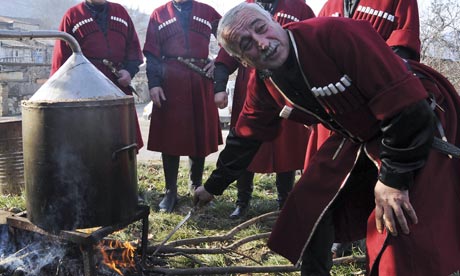 25.04.2013. Alaverdi Monestry produces 30,000 litres of wine a year using the old qvevri method. At my table are nine people. Eight have long beards and are strictly religious. They are priests and bishops. The other is me. All of us have a glass of yellow wine and are toasting… I am not sure what.
25.04.2013. Alaverdi Monestry produces 30,000 litres of wine a year using the old qvevri method. At my table are nine people. Eight have long beards and are strictly religious. They are priests and bishops. The other is me. All of us have a glass of yellow wine and are toasting… I am not sure what.Inside the Alaverdi Monastery, in the heart of the Kakheti wine region, are bottles and bottles of wine that have been researched, studied and cultivated here since the 11th century. Bishop David stands up with the slightest of wobbles. He has engaging black eyes and a raw-boned frame. He is still youthful but this fact is disguised by a long, wispy beard.
Bishop David speaks eloquently about the monastery’s history, or so I’m told. I have no understanding of the language, so snippets are translated for me. Bishop David stands at the head of the table as the ‘tamada’ (toastmaster), elected to toast and maintain discipline. This ancient ritual of host has been preserved throughout Georgian history and continues here, as Bishop David delivers a lament on wine production and the responsibility of the monastery as a wine academy. ‘Wherever there are monks, there is wine being made,’ he says.
The recently excavated eighth-century cellar has been restored and the monastery produces more than 30,000 litres of wine a year under its own label using the qvevri method – which uses a large earthenware vessel to ferment wine – as well as modern methods that use stainless-steel fermentation containers.





